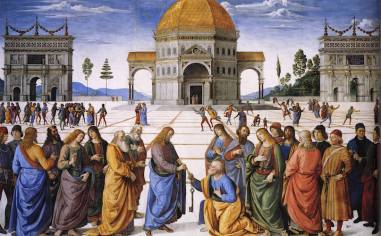A talk given to the clergy of Peterborough Diocese: 15 November 2017
Jesus, looking at him, loved him and said, ‘You lack one thing; go, sell what you own, and give the money to the poor, and you will have treasure in heaven; then come, follow me.’
I’m very flattered to have been invited to speak to you this afternoon. Thank you so much for the invitation, and above all, thank you for having the good sense to have your conference virtually on a straight line which connects my home in Wolverhampton to the place where I have a meeting with an Archdeacon and a PCC at 7.30pm. Good taste, organisation and providence. I’ve had the joy of meeting some of you recently in Corby when we met to consider some of the issues connected with estates ministry, which (as you can imagine) is a not unrelated theme to my title today, which is being sent by Jesus to the poor.
It’s very easy to characterise the concept of poverty being about the material, about finance, food and shelter, all the things we surround ourselves with, or not in the society in which we live. Poverty has many facets and manifestations, and there are times when the words of Jesus seem to point in different directions. We might think of poverty of spirit, specifically blessed in the Beatitudes; we might think of moral or spiritual poverty. It is impossible to deal with all this and still get to Stoke in time, so this is inevitably selective:
but it’s worth noting that Luke Bretherton determines four primary meanings of poverty in the Old Testament: they are destitution, powerlessness, affliction and humility. More tellingly still, Sam Wells writes that poverty is
‘about having no idea what to do and/or having no-one with whom to do it.’
First, however, a word about the premise of the statement. Everyone in this room believes that they have been sent, and yet one of the debates we often have (and one which is worth having) is the particularity we attach to the direction of that vocation. We might think of having a strong sense of ‘calling’ to this place or that, or we might think in much more general terms. How many of us would characterise our calling as a call to serve the poor as a first-order priority? How many of us would suggest that a desire to serve the poorest in society has been a characteristic of present position and location? This is even harder to tease out in a culture which deals with appointments by competitive interview, and I suspect that we try to theologise, or even rationalise, the places we end up – a kind of post-dated cheque. I think of the places I have served, and (more germanely) the roads not taken, and I suggest that to be ‘sent by Jesus’ is a much more mysterious thing than we tend to admit. More about that later, if you want.
A few weeks ago I met with one of my local councillors in the Spring Vale ward in Wolverhampton. One of the many things we discussed was our respective faith communities. I confessed to never having been to Gurdwara, while she confessed that she had never been to church. In the face of such irreligiousness, she kindly invited me to visit her Gurdwara in the backstreets of inner-city Wolverhampton. It was her daughter’s tenth birthday party, and I would be very welcome. I must cover my head, and remove my shoes on entrance. And so I appeared at the appointed time, and received the most effusive welcome I have had anywhere. I was ushered into a large communal room, and was urged to take a tray and to take some food, and eat. I ate, and thoroughly enjoyed it. In the meantime, I was introduced to one of the senior members of the Gurdwara, and we talked theology for over an hour. Eventually we went upstairs, where I experienced the beauty and devotion of Sikh worship for the first time. There was food there too. Afterwards it was downstairs for the birthday celebrations, and there was cake, and singing, and gifts, and lots of general happiness. And then there was more food. Three choices of vegetarian curry, all cooked on site, with all the trimmings. And I learned a very important thing. You can go into a Gurdwara, anywhere in the world, and they will feed you. I was told of a Scottish gentleman in Wolverhampton who visited the Gurdwara six days a week, twice a day, every week. And they fed him. Every time. The Golden Temple at Amritsar serves (on an ordinary day) 50,000 hot meals a day, and twice that at festivals. The feeding is integral to the expression of community, and if you go to be fed, no-one will ask you why you are there. They see you, they feed you. It was spectacular. I can confirm that I was very full, and only picked at my supper, and that before my visit there I weighed in at ten and half stone.
The next week, my councillor came to church, as she wishes to do now once a month in order to learn about Christianity and the Christian community. I spent a lot of time reflecting on what I had learnt, and how embarrassed I was going to be when she was offered a Custard cream or Fruit Shrewsbury with her tea or coffee after church. I then though about what a wonderful a lesson this was, to this priest who has been trying to understand the lifestyle implications of Eucharistic living for all his ordained life, (let alone preach about it) and how natural it all seemed.
There were two aspects to this in particular, which pose the beginnings of a challenge to our understanding of what it means to be sent by Jesus to the poor. The first is the sheer lack of judgementalism. When we are approached to help someone who is struggling, how anxious we can be to justify the assistance we give. In genuinely trying to do the right thing by someone in need we can impose certain caveats on our generosity. The second aspect is our understanding of eucharist, not in the sense of merely being a meal, but in the mystery of what our participation says about the God we worship and who in Jesus Christ becomes present among his people in a very particular way. I am the bread of life, says Jesus, and the very act of incorporation in his Body and His Divine Life involves being fed. Above all, I relished the notion that no-one who is hungry is ever turned away, and that any sense of moralising was removed from the transaction at a stroke. Both of these things are designed to take away fear, and raise the dignity of a person in need. Above all, I realise that the Christian community I serve has a long road to travel, as do I. It surprised me, for sure, and I have spent time thinking through the implications of sacramental thinking in our consideration of such questions as a result of the encounter.
Many of our churches serve people in material need with huge distinction. In my own city of Wolverhampton I think of the Order of the Brothers of St John of God, otherwise known as the Brothers of the Good Shepherd, who have recently expanded operations into large city centre premises owned by the Methodist Church. There they feed, shelter and tend to an increasing number of souls in a city where countless lives are blighted by poverty, addiction, unemployment and mental illness. In my own church we have a large green plastic bin – the first thing you see when you go through the door where parishioners place their contributions of non-perishable food; I suspect every church in the local area is doing the same. There are a variety of responses to the poverty which is on our doorstep, or in our area, or the poverty which we know exists in various parts of the world.
In the ministry of Jesus, it’s clear that human needs are met. People are miraculously fed, healed, restored, made whole. This reflects God’s overall activity in creation whilst at the same time teaching us something of what God is like. The feeding of the five thousand, the feeding of the four thousand, are images of ‘bread in the wilderness’. These are truly ‘signs of the kingdom’ moments when we receive a glimpse of eschatological fulfilment. The local church’s approach to the poverty of so many of our doorsteps will vary according to context, experience, network and expertise. It will depend on whether we inhabit the inner city, the estate, the suburb or the countryside, for poverty can inhabit all these places too. It will also depend on the heart, the desire, of the local Christian community to seek to be part of a solution to a serious presenting issue. We have started to prepare for the impact of Universal Credit in Wolverhampton, and we expect that there will be more referrals, more calls on food banks, more doorstep feeding: the these things even need to be present in one of the most prosperous countries in the world suggests that we have a major problem. It isn’t merely a problem of feeding, and clothing, and housing: it is a problem of education, aspiration and employment. Many people in such challenging contexts give up hope of things ever being better. We Christians know how important hope is in the context of the big picture of our existence. A life which is surrounded by challenges and devoid of hope is a terrible thing. In short, it is dehumanising – a word we encounter time and time again when we think of poverty, and the poor. Eduardo Galeano offers this chilling assessment in his work ‘The Nobodies.’
“Fleas dream of buying themselves a dog, and nobodies dream of escaping poverty: that, one magical day, good luck will suddenly rain down on them – will rain down in buckets. But good luck doesn’t rain down, yesterday, today, tomorrow or ever. Good luck doesn’t even fall in a fine drizzle, no matter how hard the nobodies summon it, even if their left hand is tickling, or if they begin the new day on their right foot, or start the new year with a change of brooms. The nobodies: nobody’s children, owners of nothing. The nobodies: the no-ones, the nobodied, running like rabbits, dying through life, screwed every which way. Who are not, but could be. Who don’t speak languages, but dialects. Who don’t have religions, but superstitions. Who don’t create art, but handicrafts. Who don’t have culture, but folklore. Who are not human beings, but human resources. Who do not have faces, but arms. Who do not have names, but numbers. Who do not appear in the history of the world, but in the crime reports of the local paper. The nobodies, who are not worth the bullet that kills them.”
To the Christian, any such analysis should bring about a sense of horror. The dehumanized description which Galeano offers is the polar opposite of the life which Jesus speaks of when he says ‘I came that they might have life, and have it to the full. (John 10.10). Notice in particular the enticing sentence ‘who are not, but could be.’ Part of any mission to those who are poor consists in the unlocking of potential, encouragement, access to education, training, possibilities which had not previously suggested themselves. All of this requires a sense of partnership with other agencies, especially schools and local councils and councillors, with their own knowledge of the area and what resources might be possible. If Jesus sends us to the poor we should be conversant with the causes of material poverty, such as discrimination and corruption, the lack of a level playing field, lack of opportunity, low self esteem which needs to be raised so that self-worth id recognised and personal responsibility taken.
This last point is an important one – one made recently by Darren McGarvey, who I freely admit I encountered on the Radio for the first time 48 hours ago, but who spoke so compellingly about the power of the combination of solidarity and the taking of personal responsibility in the matter of improving the lot of what he terms the ‘underclass.’ In particular he stated that (and I’m paraphrasing) his own more recent positive lifestyle choices, away from alcohol and substance abuse and towards healthier living were changing his future families DNA, and prospects. He saw himself as a link in a chain, looking to future as well as past. It was impressive, and the book is called ‘Poverty Safari’ and looks like a good investment of £2.84 for the Kindle version. I am not his agent.
But dehumanisation has different aspects. Our title, ‘Sent by Jesus to the Poor’ would be problematic to a theologian such as Stanley Hauerwas, because to use this terminology ‘turns the poor into objects.’
This becomes even more radical when he continues
I am highly suspicious of that phrase as produced by capitalist economies. ‘The poor’ cannot help but become an abstraction because capitalists need ‘the poor’ to secure their own identity’.
If that is true, it is horrific. Any system which requires poverty in order to function is immoral. And it is getting worse, not better, as questions of debt – personal and corporate – threaten to overwhelm individuals and family units at a terrifying rate. To use the phraseology of the National Consumer Council, we live in a world in which
‘,,,we have thrown away the piggy bank on the mantelpiece and now rely on future income to buy what we want today… this has not been a painless process. There have been, and still are, serious consumer casualties on the road to financial sophistication.’
We may smile ruefully at the irony.
As we seek solutions which are local and practical, and which may in fact re-balance the resources of the world in equitable fashion, we can’t help but be handicapped by the way in which language becomes politically appropriated. This is especially true in a social media obsessed society where nuance is abandoned in favour of brief categorical statements, so that it seems that we all have to take one of two utterly opposing views. And so in quoting again Eduardo Galeano, I am conscious that the words he contrasts are politically loaded, and that you will all hear them so painted and characterised. Nevertheless, the image he offers is one which, at its best, the church in its most local manifestations might be better placed to achieve than any other agency. He wrote
I don’t believe in charity. I believe in solidarity. Charity is so vertical. It goes from the top to the bottom. Solidarity is horizontal. It respects the other person and learns from the other. Most of us have a lot to learn from other people.
It’s an important point. The implication is that in order to be a church for the poor, we must become a church of the poor, a point emphasised by Pope Francis, especially his Apostolic Exhortation Evangelli Gaudium. We must learn from the poor, self-empty, if we are to serve well.
An evangelising community gets involved by word and deed in people’s daily lives; it bridges distances, it is willing to abase itself if necessary, and it embraces human life, touching the suffering flesh of Christ in others. Evangelisers thus take on the “smell of the sheep” and the sheep are willing to hear their voice…(an evangelising community) is familiar with patient expectation and apostolic endurance.
Or, to put it another way, hang in there, and hang tough. Being sent by Jesus to the poor is a long-term project. Working with people in poverty does not respond to three, or even five year funding cycles. This is about long term commitment, on the part of church communities, lay workers, clergy and lay, diocese and parish and it is challenging work. I say this acknowledging that our own resources are scarce. The insights of Bishop Philip North – he was bound to appear sooner or later – about the difference between giving and receiving parishes is helpful in this connection – that poor parishes who are so often characterised as being ‘receiving’ parishes are actually ‘giving’ parishes in spiritual terms – and if we take the widow’s mite seriously a lot of the proportionate giving in poorer parishes is higher than in parishes with a more affluent demographic.
The way we use resources is very much a part of our vocation to serve the poor.
I delighted the other day in a letter sent by Dorothy Day in 1960 to the Treasurer of the City of New York. A property used as a community house for the poor had been compulsorily purchased – effectively confiscated from them. The payment was delayed eighteen months, but when it finally arrived the City Treasurer had added the interest. Dorothy Day returned the interest, and wrote
As Catholics we are acquainted with the early teaching of the church. All the early councils forbade it, declaring it reprehensible to make money by lending it out at interest. Canon Law of the Middle Ages forbade it and in various decrees ordered that profit so obtained was to be restored. In the Christian emphasis on the duty of charity, we are commanded to lend gratuitously, to give freely, even in the case of confiscation, as in our own case – not to resist, but to accept cheerfully
But, you may argue – and especially if you are Church Commissioner – that’s how we pay stipends, how we sustain the infrastructure of the church, how we… well, yes, but that’s the challenge to living a gospel centred life in a complicated culture. And we will all have arguments for and against, because what Dorothy Day is saying is thoroughly subversive. She knew that the very act of sending back the interest will raise questions at a deep level – and it was the unjust system, not the individual, against which she railed. I think I read somewhere that we are to challenge unjust structures in society – perhaps this was the sort of thing that was being referred to.
When we serve the poor, we serve Jesus who has sent us, very directly, as Matthew 25.40 makes clear: Truly I tell you, just as you did it to one to the least of these who are members of my family, you did it to me. But in exercising charity we do not merely help people out. Gary Anderson argues that biblical charity is actually a declaration about the metaphysical structure of the world, a declaration of belief about the world and the God who created it. In other words, a charitable act is an encounter with the living God, the one on whom we cultivate total reliance.
None of this is a particular plea for a particular kind of political activism. The only narrative that can save the world is that of Jesus Christ, and we are the stewards of those mysteries, that tradition, that radical, self-sacrificing love which promises a grace which is sufficient for us. Our task is to pray to Almighty God that we may see the situations we are in with fresh eyes, that we will listen before we speak, that we will continue the journey towards becoming poor ourselves, to equip ourselves for the greatest privilege given to us – that of service, and the revealing of the Kingdom of God.
 It seems to happen every year.
It seems to happen every year.

 In his legendary comedy sketch The Blood Donor, Tony Hancock offers us his thoughts on discernment and public service.
In his legendary comedy sketch The Blood Donor, Tony Hancock offers us his thoughts on discernment and public service. Others more qualified than me will talk about the achievements of Graham Taylor, the football manager who died yesterday. Of course, Taylor managed at club level with distinction, and at international level with immense dignity. How he maintained his sanity when caught in the headlights of the tabloid explosion which accompanied his final days as England manager is testimony in itself.
Others more qualified than me will talk about the achievements of Graham Taylor, the football manager who died yesterday. Of course, Taylor managed at club level with distinction, and at international level with immense dignity. How he maintained his sanity when caught in the headlights of the tabloid explosion which accompanied his final days as England manager is testimony in itself.